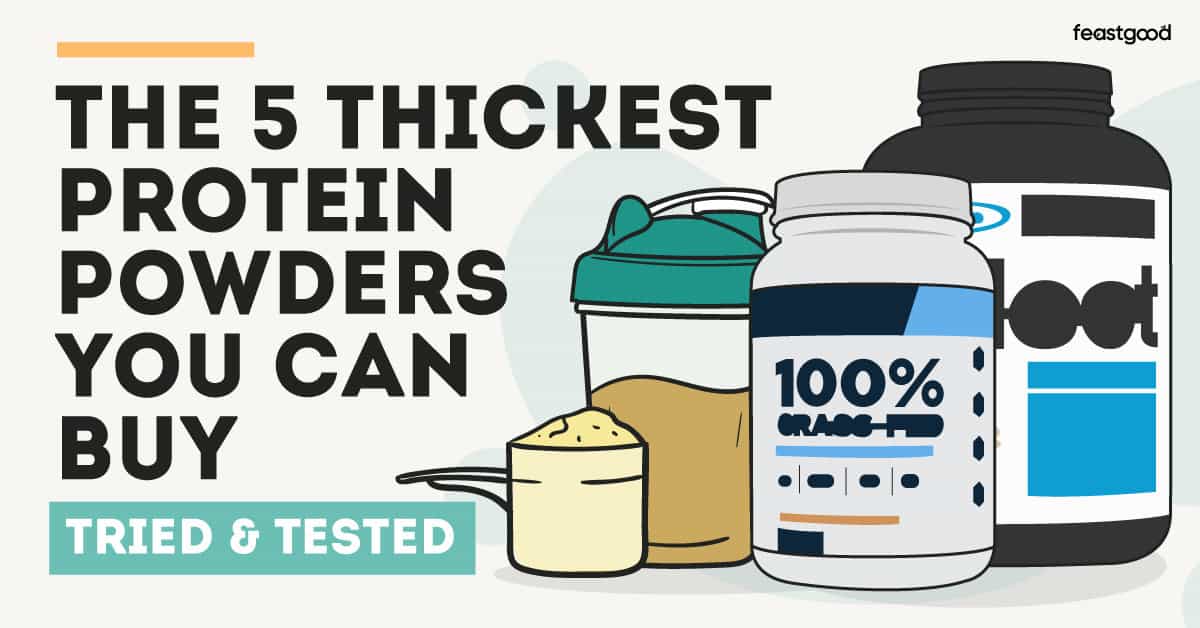Some links in this article are affiliate links, which means we earn from qualifying purchases. Learn more.
If you’re shopping for a protein powder, you might be looking for one with a thicker texture as opposed to one that mixes up thin.
If you’re anything like me, you prefer thick protein powders because they fill you up more.
Some key factors can contribute to a protein powder’s thickness, some of which are better than others (which I’ll explain below).
Based on my ten years of experience as a supplement store manager and nutrition coach, I have reviewed the five thickest (and best) protein powders across various categories.
If you’re in a rush, here’s my top pick:
The best thick protein powder is PEScience Select Protein. It has 80% protein per scoop, and the combo of whey and casein makes it great for both post-workout or any time of day. After trying it multiple ways (mixed with water, milk, & oatmeal), it tasted the best. It’s also 3rd-party tested to ensure label transparency.
Summary: Our Top 3 Picks

Best Overall
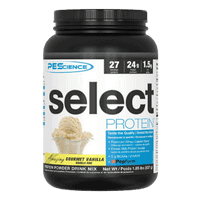
PEScience Select
4.0 /5
Thickness Level
5.0 /5
Mixability
4.0 /5
Taste
4.0 /5
Protein percentage per scoop
4.0 /5
Price
Type of Protein Used

Best Casein
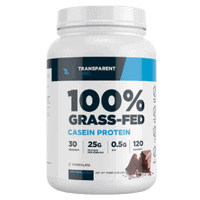
Transparent Labs Casein
5.0 /5
Thickness Level
4.0 /5
Mixability
4.0 /5
Taste
4.0 /5
Protein percentage per scoop
3.0 /5
Price
Type of Protein Used

Best Tasting
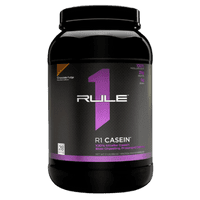
Rule1 Casein
5.0 /5
Thickness Level
5.0 /5
Mixability
5.0 /5
Taste
4.0 /5
Protein percentage per scoop
3.5 /5
Price
Type of Protein Used
Medical Disclaimer: The material presented in this article aims to offer informational insights. It should not be perceived as medical guidance. The views and writings are not designed for diagnosing, preventing, or treating health issues. Always consult with your physician prior to starting any new dietary or supplement routine.

What Factors Contribute to a Thick Protein Shake?
Before purchasing a protein powder based on thickness, it’s important to know how companies create thick protein powders so that you know what to look. There are 3 factors that create thick protein shakes:
1. Type of Protein Powder (Whey Isolate vs Concentrate vs Casein)
There are many different types of protein that can be used in a protein powder, including both plant-based and animal-based.
The most common dairy-based protein powders include whey isolate, whey concentrate, and casein protein.
As a general rule, whey isolates mix up the thinnest, followed by whey concentrates. Assuming there are no additional ingredients or factors, casein protein will mix up the thickest.
The reason for this all comes down to the natural properties of the protein powder and how it’s manufactured. As whey protein gets processed, it goes through additional levels of filtration to remove the excess carbs and fats, resulting in a thinner product.
Casein protein is dairy based, like whey, but is a lot more absorbent and slower digesting, resulting in a thicker protein shake.
If you are browsing for a protein powder and want to make sure that yours has some thickness to it, look for one that has some casein protein included.
2. Additional Ingredients Like Lecithin And Xanthan Gum
Companies will occasionally add extra ingredients to improve the thickness or mouthfeel of a protein powder.
Two commonly added ingredients include: lecithin and xanthan gum.
Lecithin (most commonly found in protein powders as soy lecithin or sunflower lecithin) is used as an emulsifier, which can increase mixability and reduce clumping. A side effect of including lecithin in a protein powder is that it can add some thickness to the powder’s consistency.
While lecithins play several roles, xanthan gum is used almost exclusively as a thickening agent. If you see a protein powder that has xanthan gum in its ingredients, you can be assured that it is going to mix up thicker.
Both xanthan gum and lecithins (from sunflower and soy) are non-nutritive additions, meaning they don’t provide any calories or nutritional value. They’re safe additions to your protein and are added to improve the texture and mixability of the powders.
Some products like meal replacements or weight gainers will add fibre or maltodextrin to their formulas, which can also lead to a thicker shake.
In some cases, added ingredients are a positive thing. Added fiber for example can provide benefits like improved satiety, supporting cholesterol health, and supporting gastro-intestinal health.
Maltodextrin is a calorie-dense carbohydrate source, so adding it to a weight gainer, meal replacement, or post workout product can be beneficial for weight gain and muscle recovery.
Added maltodextrin in a protein powder, however, can lower the protein percentage which may be undesirable if you are prioritizing protein content.
3. How You Mix It
You can also personally impact how thick (or not) your protein powder mixes up.
Using plain water, and/or and using a higher volume of liquid (8 or more ounces) will result in a shake that is thinner.
For a thicker shake, mix your protein powder with less liquid (~6 ounces), or use thicker liquids like milk or milk substitute.
Additionally, you can make protein powder thicker by blending it with water and ice, which is a great way to increase thickness while not increasing calories.
Another ingredient that you can add to any protein shake is xantham gum.
I mentioned above that supplement companies usually add this ingredient to their formulas to increase thickness. But, as a consumer, you can readily buy this ingredient at the grocery store and add it yourself (you can find it in the baking aisle).
Xantham gum is 30 calories per tablespoon, but you only need to add ¼ to ½ tablespoon to your shake to increase the thickness.
If you want a protein powder that mixes up thick straight out of the bottle, below are my top 5 picks.
Best Thick Protein Powders
- Best Overall: PEScience Select Protein
- Best Casein: Transparent Labs Casein
- Best Tasting: Rule 1 Casein
- Best For Baking: Quest Protein Powder
- Best For Post Workout: Transparent Labs Grass-Fed Whey Isolate
1. Best Overall: PEScience Select Protein
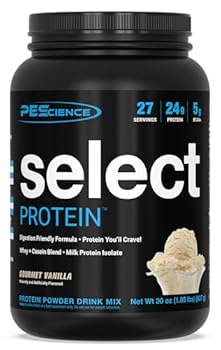
Overall rating: 4.5/5
PEScience Select Protein uses a blend of whey isolate and casein protein, combining a fast and slow-digesting protein powder together.
The result is a product that mixes well but mixes up thick and provides more prolonged satiety than an isolate protein alone.
PEScience has 23-24g of protein per scoop, and 110-125 calories per serving resulting in a product that is between 73% and 87% protein per scoop, depending on which flavor you get.
Note: Chocolate truffle was the only one I found that dropped below 80% protein per scoop, and is the only flavor of the 10 available flavors that I don’t recommend if you are looking for a good protein percentage
There are other proteins on this list that rank higher than PEScience in specific categories, but I ranked PEScience as number 1 because I feel that the blend of protein and price point makes it a better option for a higher percentage of people.
For example, there are other proteins on this list that mix up thicker than PEScience, like Transparent Labs Casein and Rule1 Casein.
The downside to Transparent Labs and Rule1 Casein proteins is that since they use exclusively casein protein, they may be more reactive for individuals with dairy sensitivities, and aren’t really recommended as an ideal post-workout option.
This is why I feel that PEScience is more suitable for a wider audience – the combination of proteins makes it suitable for many use cases.
Notwithstanding, the taste of PEScience is AMAZING. I have personally tried Cake Pop, Snickerdoodle, Cookies N Cream, and Frosted Chocolate Cupcake, and they are all creamy and delicious.
- Want to learn more? Read my in-depth PEScience Protein Review.
Highlights
- Gluten-Free and Third Party Tested
- Combination of whey and casein creates a “best of both worlds” scenario
- Tastes phenomenal and mixes well
- Reasonably priced considering the high-quality ingredients
Drawbacks
- Protein percentage varies based on which flavor you choose, ranging from 73-87% protein per scoop
- Uses artificial sweeteners (sucralose)
2. Best Casein: Transparent Labs Casein
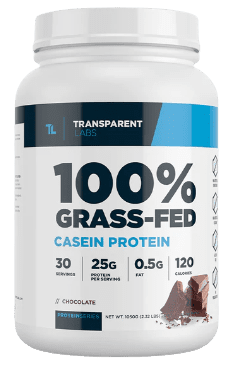
Overall rating: 4/5
As far as casein proteins are concerned, Transparent Labs Casein takes my number one spot.
Transparent Labs Casein is third-party tested, with the results publicly displayed online.
Their formula is gluten-free and uses no artificial flavors or colors. The only ingredients in Transparent Labs Casein are grass-fed casein, cocoa powder, natural flavors, salt, and stevia extract.
My reason for not having Transparent Labs Casein listed as number one overall in this article is due to versatility. Being exclusively casein, this product is optimal for taking before bed to support muscle recovery and growth, but isn’t ideal for other times throughout the day.
In other words, don’t grab Transparent Labs Casein if you’re looking for a post-workout option.
PEScience, on the other hand, with the inclusion of whey protein makes it more versatile and usable for a wider variety of people.
Transparent Labs Casein has 25g of protein per serving and 120 calories per scoop, making it 83 percent protein per scoop. This is on the high end for a “good protein source”, which is one that has between 75 and 84% protein.
There are other high-quality products on this list that use exclusively casein protein, like Rule 1 Casein, but save money by using artificial sweeteners and not investing in third-party testing. If you are on a tighter budget, then you might opt for Rule 1.
However, if your priority is investing in a casein protein that uses the highest quality ingredients, then stick with Transparent Labs Casein.
Highlights
- Third Party Tested
- High percentage of protein per scoop (25g offering 83%)
- No preservatives, fillers, or unnecessary added ingredients
Drawbacks
- On the more expensive side (around $2.00 per serving)
- Limited selection of flavors and sizes – currently only 30 servings of chocolate is available online
3. Best Tasting Casein: Rule1 Casein
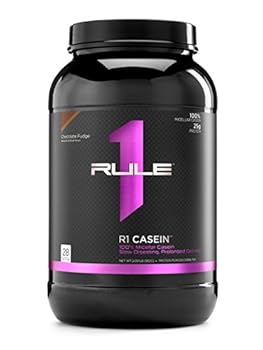
Overall rating: 4/5
Rule 1 Casein has 25g of casein protein, the same amount and type as Transparent Labs.
The biggest distinction between the two products is that Rule1 uses sucralose in their formula, they are not certified third-party tested, and their casein protein doesn’t come from grass-fed whey.
These distinctions result in a product that is more suitable for individuals on a tighter supplement budget, with the cost per serving ranging from $1.07 to $1.59, depending on the size purchased and where you order from.
Rule1 is well known for having great-tasting products, and their casein doesn’t disappoint. Reviews from both my customers in-store and online rave about the delicious taste.
While most brands have a limited selection of flavored casein proteins, Rule1 Casein is available in 6 different flavors: Chocolate Fudge, Chocolate Peanut Butter, Cookies and Creme, Lightly Salted Caramel, and Strawberries and Creme.
Rule1 Casein is available in two different sizes, 2 lb (~28 servings) and 4b (~55 servings), though Chocolate Peanut Butter and Salted Caramel are not available in the 4lb size.
Rule 1 bridges the gap between quality and quantity, and is a good option if you want a really thick protein that tastes great and mixes well.
- Want to learn more? Read my in-depth Rule 1 Protein Review (Note: this is my review of the whey isolate, not casein).
Highlights
- Reasonable cost per serving (as low as $1.07 per serving)
- Incredible taste and wide variety of flavors
- High protein percentage per scoop (83%)
Drawbacks
- Uses artificial sweeteners and some flavors use artificial food dyes
- Is not third-party tested
4. Best for Baking: Quest Protein Powder
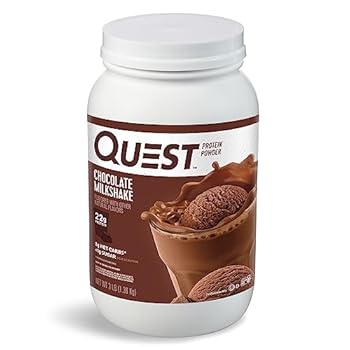
Overall rating: 4/5
Quest Protein Powder is very similar to PEScience, using a blend of whey protein isolate and casein protein in their formula as well as flavoring from sucralose and stevia.
The thickness and texture are created by the addition of lecithins and xanthan gum.
There is a lot of variability between flavors regarding protein and calorie content.
Cookies and Cream, for instance, has 20g of protein and 100 calories (80% protein per scoop).
Vanilla milkshake has 24g of protein and 110 calories. Though the calories in vanilla are higher, the higher grams of protein bump this flavor up to 87% protein per scoop.
Salted caramel goes all the way up to 26g of protein per scoop, so depending on which flavor you choose your protein content will be anywhere from 20g to 26g per scoop, and range from 80% to 92% protein per scoop (the highest being the unflavored Multi-Purpose Mix).
Quest Protein Powder is a great option for baking, and it comes in six different flavors, as well as an unflavored protein option that can be added to any recipe to boost its protein content.
Since everything from the cost per serving to protein content is so similar, the reason for this product not taking the number one spot from PEScience comes down to taste and mixability.
Quest Protein definitely has a product that is great for baking and tastes good when mixed into things, but leaves a bit to be desired when consumed on its own just mixed with water.
When compared with PESCience, Quest Protein mixes up a bit more clumpy and doesn’t taste as good when mixed with just water.
Highlights
- Great for baking
- Good to Great protein percentage
- Gluten-free and third-party tested
Drawbacks
- Varying amounts of protein per scoop, from 20g to 26g depending on the flavor.
- Below average taste when mixed with water
- Higher cost per serving than similar products on the market
5. Best For Post Workout: Transparent Labs Grass-Fed Isolate
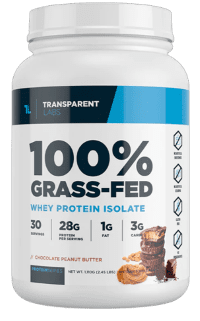
Overall rating: 3.5/5
I wanted to include a whey isolate on here to have a protein that meets the thickness criteria, but can also be a great post-workout option (since whey isolate is fast digesting).
When it comes to rating Transparent Labs Grass-fed Isolate as a protein, it has a near-perfect score across several criteria (taste, quality, transparency).
However, at around $2.00 per serving, the cost can be a deterrent for some people (the average cost of a whey isolate is $1.34 per serving).
Transparent Labs Grass-Fed Isolate, similar to their casein, has no additional fillers or preservatives and doesn’t use artificial flavors, sweeteners, or colors.
Like all Transparent Labs products, their isolate is third-party tested and gluten-free.
As far as “thickness” level, this one will be the thinnest protein powder on this list since it’s made from purely whey isolate.
For this reason, I’ve dropped the rating down to 3.5/5 because this article is looking specifically at thick protein powders, and while this is the “thickest of the thin”, it’s still the thinnest as per the criteria.
That being said, when I was writing my in-depth review of Transparent Labs Whey Protein, I remember that I couldn’t believe how thick and smooth it mixed up, and it felt like it gave a lot better satiety than other whey isolates, especially when I stuck to the recommended 6 ounces of water.
If you want a high-quality post-workout shake that leaves you feeling satisfied, give Transparent Labs Grass-fed Isolate a try.
Here’s a pro tip if you want it thicker: try adding ¼ to ½ tsp of xanthan gum to your shake. It’s tasteless and will thicken it up instantly.
Highlights
- Third party tested and gluten free
- Very high protein percentage per scoop (93%)
- Tastes great and mixes easily
Drawbacks
- High cost per serving
- As an isolate protein, it’s the “thickest of the thin”, and won’t mix up as thick or creamy as products which have casein added
Key Criteria: How To Choose The Best Thick Protein Powder
Thickness Level
Since I’m assessing thick proteins, “thickness” was my number one criterion when putting together this list.
While there are different ways to mix protein (e.g. with water, with milk, into smoothies, into oatmeal, into baking), for the purpose of this article, thickness refers to how thick a product is when mixed with just water.
- Why you should care: There are ways you can manipulate your product to thicken it (like adding xanthan gum), but if you’re shopping for a thick protein then chances are you don’t want to have to worry about buying additional products or mixing in multiple ingredients.
Type of Protein Used
Protein powders can use a wide variety of proteins, from plant-based sources to dairy, beef, or salmon.
Even among dairy-based proteins, there’s some selection, including whey isolate, whey concentrate, and casein protein.
Above, I made sure to outline what type(s) of protein powder is used in each product.
- Why you should care: Different proteins naturally have different thickness levels. Casein is the thickest, followed by whey concentrate and then whey isolate. Knowing what type of protein is in your powder can help you predict how thick it will be.
Mixability
Mixability refers to how easily and how completely a powder mixes up when shaken in a traditional shaker cup.
- Why you should care: Thickness is desirable, but clumpy and chalky protein is not. You want to make sure that your protein is thick to drink, but still drinkable.
Taste
While taste can be subjective, I assess proteins based on sweetness level, flavor level, and read extensive reviews online to try to get a big picture idea of what everyone thinks (not just what I think).
- Why you should care: Regardless of how dedicated you are to your goals, it’s easier to stay on plan and consume your products if they taste good. With advancing technology, there’s no need for your product to sacrifice taste for quality.
Protein Percentage Per Scoop
Protein percentage per scoop simply refers to what percentage of calories within a product come from actual protein.
To find this, I take the total grams of protein and multiply it by 4 (since protein contains 4 calories per gram), and then divide that number by the total number of calories.
- Why you should care: Some companies will increase the thickness of their products by adding non-protein ingredients (like MCT powder, maltodextrin, or fiber). When shopping for a thick protein powder, you may not want to sacrifice protein content just for the texture.
Price
Since I’m comparing a variety of protein powders, there’s also a variety of price points.
Some products are higher because they use higher quality ingredients, and some products charge more because they have high brand recognition and know people will pay for their products.
I’ve assessed proteins based on the median cost per serving in each protein category.
- Why you should care: You may not have a tight budget when shopping for supplements, so you might be willing to pay more for the highest quality products. Conversely, you might have a smaller supplement budget and want to optimize quality while sticking within that budget.
Our Testing Methodology Explained
At FeastGood.com, we use a variety of research methods to bring you the most complete reviews we can.
In some instances, we have done in-depth reviews for products that are already published on our website.
- PEScience Select Protein
- Transparent Labs Grass-Fed Isolate
For the other products in this article, I am drawing from both my 10 years of experience as a supplement store manager and product tester.
Rule1 Casein and Quest Protein are two products in my store with great customer feedback and a lot of return customers. Quest Protein powder has been on my shelves for years, and it has a very loyal following of customers who won’t even consider trying something else.
Rule1 Casein is a newer product to our store, but most of our casein customers have switched to Rule1 from other brands whose costs drastically increased (due to inflation). Customers praise Rule 1 for its good value and fantastic taste.
I have personally extensively used and tested Transparent Labs products, and trust the quality of the brand enough to recommend their casein above all others.
As far as giving you complete feedback on taste, quality, and mixability, I relied heavily on reviews left on Amazon, brand websites, and Q&A sites like Reddit and Quora, as well as on feedback and reviews from other members of the Feastgood.com team.
Taste, especially, is a subjective measure, meaning that it is a matter of opinion and people seldom agree unanimously. By reading through these reviews and websites, I can bring you the most complete picture of what consuming each product will be like.
Reference
Kim J. (2020). Pre-sleep casein protein ingestion: new paradigm in post-exercise recovery nutrition. Physical activity and nutrition, 24(2), 6–10. https://doi.org/10.20463/pan.2020.0009
About The Author

Jennifer Vibert is a Certified Strength and Conditioning Specialist, Nutrition Coach, and supplement store manager. She has a Bachelor of Kinesiology with a major in Fitness and Lifestyle and a minor in Psychology from the University of Regina. She is a Certified Nutrition Coach through Precision Nutrition, with a passion for helping clients learn the fundamentals of nutrition and supplementation in order to build healthy, sustainable habits.
Why Trust Our Content

On Staff at FeastGood.com, we have Registered Dietitians, coaches with PhDs in Human Nutrition, and internationally ranked athletes who contribute to our editorial process. This includes research, writing, editing, fact-checking, and product testing/reviews. At a bare minimum, all authors must be certified nutrition coaches by either the National Academy of Sports Medicine, International Sport Sciences Association, or Precision Nutrition. Learn more about our team here.
Have a Question?
If you have any questions or feedback about what you’ve read, you can reach out to us at [email protected]. We respond to every email within 1 business day.
